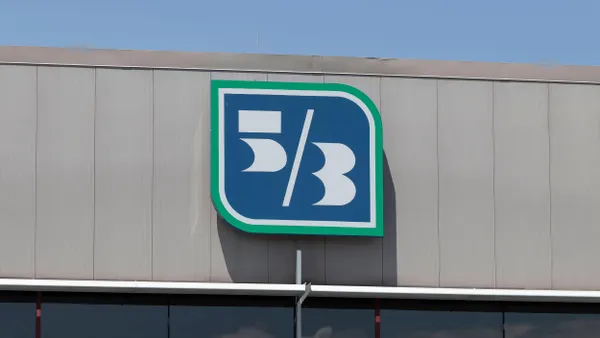Dive Brief:
- Rep. Katie Porter, D-CA, is asking Wells Fargo to repay customers "hundreds of millions of dollars" in service fees it "deceptively collected" from 2013 to 2018, according to a letter she wrote Thursday to bank CEO Charlie Scharf.
- At issue is a $10 monthly fee attached to the bank’s Everyday Checking and Opportunity Checking accounts. Customers can avoid the charge if they meet several conditions, including making 10 transactions a month. But the bank failed to explain ATM withdrawals did not count toward that threshold, Porter wrote.
- In a companywide memo written last month, on his first day as Wells Fargo CEO, Scharf wrote the bank would put "all available resources" toward making harmed customers whole, according to Bloomberg.
Dive Insight:
Wells Fargo disclosed in a Securities and Exchange Commission filing in May the bank is "reviewing certain past disclosures to customers regarding minimum qualifying debit card usage required to waive monthly service fees on certain consumer deposit accounts."
"Based on the possibility of confusion by some customers regarding the types of transactions that counted toward the waiver, we expect to refund certain monthly service and related fees to affected customers," the bank wrote in the filing.
It did not specify to which account products it was referring. But the bank explicitly noted in a customer fee document in July that ATM transactions were not included in the monthly count for Everyday Checking and Opportunity Checking. Earlier fee documents indicated customers could avoid the service fee with "10 or more posted debit card purchases and/or payments" from the checking account.
It is not clear how many customers are affected, but Everyday Checking and Opportunity Checking are Wells Fargo’s most popular checking accounts, according to The Capitol Forum. About 10% of Wells Fargo customers do not meet one of the conditions for free checking, the bank told the publication in August.
Adding to possible customer confusion, Porter wrote, were personal finance columns published in the Huffington Post and the Charlotte Observer, advising consumers Wells Fargo would waive customers’ monthly maintenance fees if they used their bank-issued debit cards 10 or more times a month.
Wells Fargo applied the 10-purchase rule to Opportunity Checking in April 2013 and to Everyday Checking in September 2014. But for years, Wells Fargo branch employees were expected to verbally explain to customers that ATM withdrawals were not purchases under the free-checking program, current and former bank employees told The Capitol Forum in August.
"If the customer was irate, we might waive the fee," one branch employee said. But there was no consistent policy on when that should happen.
"We got a few complaints every week about this," a California branch employee said.
Wells Fargo customers began receiving alerts in early 2018 indicating how close they were to the 10-transaction threshold, a bank spokesman told The Capitol Forum.
Porter’s letter raises the specter of yet another potential scandal for a bank that has been rocked by several in the past few years. Wells Fargo made headlines in 2016, when it was revealed that employees opened millions of fraudulent accounts to receive sales-based incentives.
And an August report by The New York Times revealed a policy which allowed Wells Fargo accounts to remain open even after customers thought they had closed them, prompting some customers to be charged thousands of dollars in overdraft fees.
Wells Fargo told The Capitol Forum in August that refunding customers who were wrongly charged is "the right thing to do." But Porter wrote the bank hasn’t given specifics as to how it will fix the problem.
Adding an extra measure of pressure, Porter also wrote to two of Wells Fargo’s regulators, the Office of the Comptroller of the Currency (OCC) and the Federal Trade Commission (FTC), indicating that the bank provided "incomplete information over a span of multiple years" even though it knew some customers were "confused" by its policies, according to The Washington Post.
Wells Fargo spokeswoman Jennifer Dunn told the Post the bank has received Porter’s letter and will respond directly.
Porter asked that the bank refund affected customers ahead of the holiday season.
"I am hopeful that under your new leadership, the Bank will undergo the reputational transformation that you state is your number one priority," Porter wrote. "Before Wells Fargo can in good faith begin any new initiatives or public relations campaigns related to its image restoration, it must take concrete action to address and resolve its many past mistakes."













